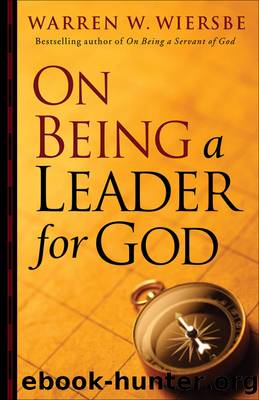On Being a Leader for God by Warren W. Wiersbe

Author:Warren W. Wiersbe
Language: eng
Format: epub
Publisher: Baker Publishing Group
King David, the Brightness after Rain (2 Samuel 23:1â7)
When we think of David, we usually think of a shepherd, which, in Scripture, is the image of either a spiritual leader (1 Pet. 5:1â4) or a civil leader (see Ezek. 34). Our word âpastorâ comes from the Latin word for âshepherd.â You can drive cattle, but you must lead sheep. When David disobeyed the Lord and took a census, God chastened the nation by slaying seventy thousand people. David pled with God, âI have sinned; I, the shepherd, have done wrong. These are but sheep. What have they done?â (2 Sam. 24:17). David saw his people as a flock, and he was touched deeply by their pains and sorrows. The Lord chose David âto be the shepherd of his peopleâ (Ps. 78:71), and David proved to be a faithful shepherd, like the Son of David who said, âI am the good shepherdâ (John 10:11, 14). Iâll say more about this later.
Davidâs last words, recorded in 2 Samuel 23:1â7, mention nothing about shepherding, though in verse 4 he does mention pastures (ârain that brings grass from the earthâ). But when you recall that David became king after the reign of Saul, the images in this passage come to life. No matter how incompetent or even how wicked a previous leader may have been, the new leader must signal the dawning of a new day. Davidâs âlast words on leadershipâ describe Godâs chosen leader arriving on the scene like sunshine after rain. He brought to the land not a destructive storm (see Isa. 25:4) but a life-giving rainfall that nourished the vegetation.
Where there is no irrigation in the Holy Land, the ground is barren until the first rains arrive; and then almost overnight the land teems with life and beauty. Godly leaders are like that.
Davidâs song reminds us that leaders are to be like sunshine and rain, both of which are necessary if the earth is to be fruitful. âMay he endure as long as the sun,â Solomon wrote. âMay he be like rain falling on a mown field, like showers watering the earthâ (Ps. 72:5â6). Solomon also wrote, âA ruler who oppresses the poor is like a driving rain that leaves no cropsâ (Prov. 28:3), and he may have had the reign of King Saul in mind. He also wrote, âLike a roaring lion or a charging bear is a wicked ruler over a helpless peopleâ (Prov. 28:15). We recall that David killed a lion and a bear to protect his fatherâs flock (1 Sam. 17:34â37), and when he became king, he replaced a man whose oppressive reign was like the attacks of lions and bears.
In ancient times in the Near East, rulers were often tyrannical and despotic. Read the book of Esther and see how Xerxes ran his kingdom. Rulers were noted for their pride (Dan. 4:28â37; Acts 12:19â24) and anger (Dan. 3), as well as their unwillingness to listen to what anybody else had to sayâespecially Jehovah God. Like Pharaoh, they asked, âWho is the Lord, that I should obey him?â (Exod.
Download
This site does not store any files on its server. We only index and link to content provided by other sites. Please contact the content providers to delete copyright contents if any and email us, we'll remove relevant links or contents immediately.
Joan of Arc by Mary Gordon(3282)
Victory over the Darkness by Neil T. Anderson(2398)
The Gnostic Gospels by Pagels Elaine(2047)
Devil, The by Almond Philip C(1913)
The Nativity by Geza Vermes(1859)
The Psychedelic Gospels: The Secret History of Hallucinogens in Christianity by Jerry B. Brown(1833)
Going Clear by Lawrence Wright(1586)
Going Clear: Scientology, Hollywood, and the Prison of Belief by Lawrence Wright(1580)
Barking to the Choir by Gregory Boyle(1513)
A TIME TO KEEP SILENCE by Patrick Leigh Fermor(1507)
Old Testament History by John H. Sailhamer(1501)
Augustine: Conversions to Confessions by Robin Lane Fox(1479)
A History of the Franks by Gregory of Tours(1404)
The Knights Templar by Sean Martin(1403)
A Prophet with Honor by William C. Martin(1380)
The Bible Doesn't Say That by Dr. Joel M. Hoffman(1377)
by Christianity & Islam(1354)
The Amish by Steven M. Nolt(1257)
The Time Traveler's Guide to Medieval England by Ian Mortimer(1224)
